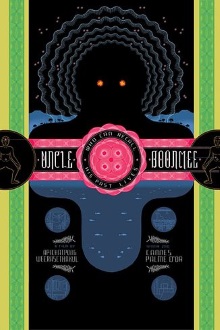
Here we have the first film from Thailand to be covered in this blog and it is by a director whose name I must confess that I will never be able to remember Apichatpong Weerasethakul. There is little doubt that this is a worthy film, it managed the impressive feat of being included in the Sight & Sound poll of the greatest films ever made. But it’s also an incredibly contentious film with many people who complain about it being impossibly boring and pointless. Just read the user comments on IMDB.
The eponynous uncle of the story is the owner of a plantation in the remote Isan region of Thailand. As he is seriously sick, the sister of his late wife, Jen, arrives to visit him. But when they sit down for dinner that night together with Boonmee’s workers, the spirit of his wife appears before them. They learn that Boonmee is dying and his impending death has attracted many spirits and animals to the area. Far from being terrified however, he accepts this with calmness and even welcomes the opportunity to set his affairs to order and see his wife again. He also uses his remaining time to reflect upon the karma that he must have had incurred to be struck down by disease and possibly contemplate the lives of his past selves as well.
The film moves at an exceedingly languid pace and is filmed in a grainy, low quality style that must be deliberate. The opening shot for example is a humdrum scene of Jen travelling in a bus along a dusty path hemmed in by trees. The colors are muted and dull, the camera is unambitious. If you were hoping for some sweeping vistas of the jungle, you’d be sorely disappointed. Why, I wondered, would the director open the film with such a boring shot? The answer I realized later is to properly calibrate the audience’s expectations for what comes later. The bus takes us, along with Jen, into the countryside and we see for ourselves that this is not the city. There, life moves at more sedate pace, the people are closer to the land, and events are rarely exciting or dramatic.
But as we soon see, the countryside has a kind of magic all of its own. It is mysterious and low-key, yet it is undeniably there. The unexpected appearance of a ghost at the dinner table should be an earthshaking event but though the characters express shock and even some measure of fear, the director makes it feel natural as if everyone were unknowingly waiting for it all along. It’s the moment when everything about the film falls in place and you realize that to these people the supernatural isn’t just something that you talk about in stories. It’s something that is as much part of the land as they are, beings who are in effect their neighbors even if they are rarely seen but must always be respected.
The special effects in this film look cheap and by all rights the appearance of an actor in a fake-looking ape suit should elicit laughter and derision. Yet such is the director’s mastery of mood and shadow that there is absolutely nothing here to make fun of. The sight of the creatures is instead chilling and you feel compelled to accord them the proper respect. One extended scene seems to take place in the distant past about a Thai princess with a scarred face who meets a talking fish while looking at her own reflection in the water. We’ve all read and seen plenty of these mythical stories but as they’re so fantastical the temptation nowadays is to treat them lightly as an amusing story we tell children or foreign tourists. This film however forces us to take this story seriously and as my wife notes even infuses it with a powerful sense of the sacred. It’s a powerful awakening of the realness of the supernatural that I think is unique to this film.
Beyond this however, it’s difficult to make of what the director might be trying to say in this film. The final scene which is set in the city is almost indecipherable. At one point Boonmee blames his bad karma on his killing of Communists in the jungle decades ago and it seems that this is a recurrent theme in the director’s work, yet it’s impossible to say how this ties into the rest of the film. The director is on record as saying that not everything needs to be understood and that he is okay with each viewer offering a different interpretation but as usual such talk only makes me suspicious of a case of the emperor having no clothes. I have to admit that after reading several reviews there are some interesting theories out there, so it could just be that I’m not observant enough to recognize all of the references.
Still even if you miss out on the deeper meanings behind the film, the way that it brings the spirit world to life makes it rather unique. As one Broken Forum poster put it, watching this film is similar to meditating and entering a different state of mind. It’s no wonder that other directors have noted this as something that no one has ever done before.
One thought on “Uncle Boonmee Who Can Recall His Past Lives (2010)”